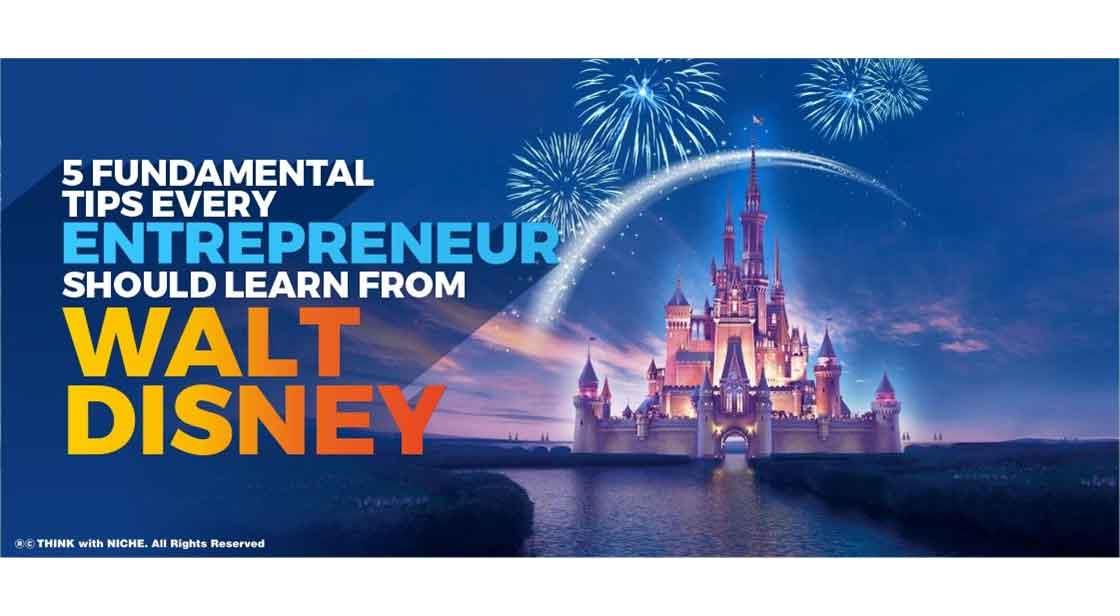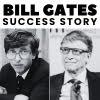5 fundamental tips every entrepreneur should learn from Walt Disney

Blog Post
Walt Disney was not a one-hit-wonder, as many people believe. He started several businesses, all of which failed. He tried his hand at running a commercial art studio, but it failed spectacularly. Walt was an inquisitive individual who was always keen to learn new things. Walt Disney was an expert at problem-solving. He was a keen observer who was always on the lookout for innovative ways to solve problems and turn them into commercial possibilities..#ThinkWithNiche
Walt Disney is a well-known figure in the world of entertainment. Almost everyone has been to a Disney park, seen a Disney film (silent or animated), or is familiar with a Disney character. Some people even take Disney cruises. For many people, Walt Disney, the man, has faded into oblivion; nonetheless, Walt transformed himself into a visionary, entrepreneur, and innovative genius. What he has achieved in his life has taught him a few valuable lessons that any entrepreneur may benefit from.
1. Never Supply Up
Many people are unaware that Walt Disney is no longer regarded as a one-hit-wonder. He founded a number of businesses that failed. He attempted to create an industrial art studio, but it failed badly. He tried to make commercials, however, they have been similarly unsuccessfully attributable to a loss of revenue. Instead of giving up or giving in, Walt could continuously strive for something new.
2. To Be a Hassle Solver
Walt Disney became an expert at resolving issues. He evolved into a keen observer who was continuously on the lookout for brand new ways to solve problems and see how they could be transformed into business opportunities. He took youngster to a park to visit a few attractions, but the rides were filthy and in poor shape, and the guy in charge of them was rude. This project was taken into consideration by Walt Disney, and the eventual outcome was Disneyland. He preferred a safe and simple atmosphere in which fathers and mothers should bring their children.
3. You Must Be Willing To Reinvent Yourself
Many people are unaware that Oswald the Lucky Rabbit, rather than Mickey Mouse, was Disney's first famous cool animated movie star. He'd reached an agreement with a distributor for the rapid cartoons, and he was delighted with their popularity. They ignored Walt as he went back to work on his contract. According to the contract, the distributor claimed that they legally owned Oswald and that Walt Disney no longer did (unbeknownst to Walt). Worse, all of Walt's animators quit and went to work for a competing animation studio. Walt returns home, having squandered his greatest accomplishment. He had to start over from the beginning.
4. Surround Yourself With Talent
Walt Disney admitted that he was no longer the most gifted designer or animator. As he quickly explained, "I started, actually, to make my first lively cool animated film in 1920. Of course, they were very crude matters then and I used a form of little puppet matters.". He developed into a genius at knowing exactly what he was doing and was able to hire the world's best artists and animators. Mickey became alive for the first time thanks to an animator named UbIwerks, not Walt Disney. Walt didn't want to be a herbal artist, but he did want to be a visionary.
5. Be Curious
Walt grew into a curious person who was always keen to learn new things. In the early years of animation, this resulted in a few significant achievements. He is credited for making the first full-length animated feature, the first sound animated film, and the first stay-motion/animation hybrid film. Walt's cartoons used to be lighthearted, mindless entertainment that ran before the main feature. Here's the thing, and don't ignore it: he had no concept how to do any of them. His curiosity compelled him to figure out how to carry out those responsibilities and figure out how to do them all.
The Bottom Line
Walt said it best: “Times and conditions change so rapidly that we must keep our aim constantly focused on the future.” Every business needs to keep looking at ways to grow and diversify.
You May Like
EDITOR’S CHOICE












